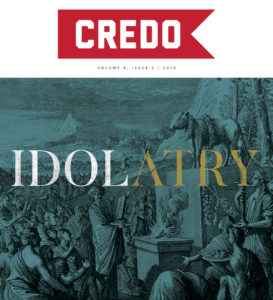While the Reformation began with Luther’s hammer-thudding protest against Rome’s idolatrous practices and abuses, John Calvin intensified the fight, waging war against dogmas that had been raised up against the true knowledge of God. However, he recognized that the greatest haven of idolatry was not the Roman Catholic Church, but the human heart.
In his Institutes of the Christian Religion, Calvin famously wrote that the heart of man was “a perpetual factory of idols,” identifying it as the ultimate source of false worship. In his Institutes of the Christian Religion, Calvin famously wrote that the heart of man was “a perpetual factory of idols,” identifying it as the ultimate source of false worship. Click To Tweet While he had seen the full force of Popish religion manifested in statues, shrines, and relics, he understood that in order to contend for true religion, one needed to deal with the heart and mind of the worshiper.
Knowing God: True vs. False
In John 17:3, Jesus affirmed, “this is eternal life, that they may know… the only true God, and Jesus Christ whom [He] has sent.” More than simply gathering facts about God, Jesus maintains that an intimate relationship with God is necessary for our heavenly future. In short, having eternal life is directly connected to personally knowing God.
God must be known through the ways in which he has revealed Himself—either generally or specially. Calvin said the human mind is prone “to lapse into forgetfulness of God,” and “readily inclined to every kind of error,” even “bent…on devising new and fictitious religions.” Because of man’s forgetfulness and error, God has revealed himself through the created order and more specifically through his word, which functions to us as a guide and teacher.
Calvin acknowledged that “error never can be eradicated from the heart of man until the true knowledge of God has been implanted in it” (1.6.3). Seeking to know God, yet rejecting his own self-revelation, is “utterly displeasing to [God], as a kind of insult to his majesty” (1.11.2). Therefore, to attempt to ascertain God by any other means than what he has ordained is nothing short of, for Calvin, idolatry.
The Origins of Idolatry
The Apostle Paul was clear in Romans 1 in identifying idolatry as an exchange of the glory of God for fallen, corrupt images, thus worshiping the creature rather than the Creator (Rom. 1:23, 25). Idolatry promises to bring human beings closer to the divine yet fails to deliver results. According to Calvin, “God…rejects, without exception, all shapes and pictures, and other symbols by which the superstitious imagine they can bring him near to them” (1.11.1). God rejects these objects because only God can bear witness to himself; no idol or image can truly represent him or ascribe to the Lord the glory due to his name. The true error of idolatry, Calvin says, is the error of attempting to ascribe a visible form to the invisible God and worshiping it.
Calvin, like most Reformers, was vehemently opposed to the use of images in Christian worship. He pointed to the error of Pope Gregory’s assertion that “images are the books of the unlearned,” and employs the use of the Old Testament, noting that “the prophets utterly condemn what the papists hold to be an undoubted axiom, i.e., that images are substitutes for books.” He corrects such error, maintaining that “all human attempts to give a visible shape to God are vanity and lies” (1.11.5). In other words, idolatry goes beyond merely external images and asserts that the true origin of idolatry is found in the human heart. He writes,
“[M]an’s nature, so to speak, is a perpetual factory of idols… man’s mind, full as it is of pride and boldness, dares to imagine a god according to its own capacity; as it sluggishly plods, indeed is overwhelmed with the crassest ignorance, it conceives an unreality and an empty appearance as God.” (1.11.8)
The heart of fallen man is an idol-making factory; a perpetual forge, a corruptible haven of idolatry. Further, he says, “the flesh is always restless until it has obtained some figment like itself, with which it may vainly solace itself as a representation of God.” Out of sinful rebellion against God, fallen man creates a false god that resembles himself, and then bows down and worships it.
This is not unlike the foolish idol maker in Isaiah 44, who cuts down a tree, using part of it for fuel to cook his food, while using another part to fashion an idol to worship. “The mind,” Calvin says, “conceives the idol, and the hand gives it birth.”
Why does humanity do this?
Because they are dead in their trespasses and sins (Eph. 2:1, 5), completely unrighteous (Rom. 3:10-18), spiritually blinded (1 Cor. 2:6-16), hateful toward others (Titus 3:3), and haters of God (Rom. 1:30); to wit, totally depraved.
Therefore, an unregenerate heart does not possess the spiritual life needed to offer to God the worship he requires; it can only function as an idol-making factory.
In Spirit and Truth
In John 4:23–24, Jesus said, “[The] hour is coming, and now is, when the true worshipers will worship the Father in spirit and truth; for such people the Father seeks to be His worshipers. God is spirit, and those who worship Him must worship in spirit and truth.”
God the Father seeks people to worship him in the manner in which He has ascribed. This is only possible when, in salvation, a spiritually-dead person is regenerated and indwelt by the Holy Spirit. This is only possible when God removes the heart of stone and replaces it with a heart of flesh (Ezek. 36:26); one that lives, believes and worships rightly. This is only possible through the Lord Jesus Christ who paid the penalty on the cross, even for the God-insulting sin of idolatry.


